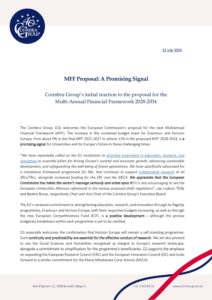MFF Proposal: A Promising Signal
22 July 2025
Coimbra Group’s initial reaction to the proposal for the Multi-Annual Financial Framework 2028-2034
The Coimbra Group (CG) welcomes the European Commission’s proposal for the next Multi-Annual Financial Framework (MFF). The increase in the combined budget share for Erasmus+ and Horizon Europe, from about 9% in the final MFF 2021-2027 to almost 11% in the proposed MFF 2028-2034, is a promising signal for Universities and for Europe’s future in these challenging times.
“We have repeatedly called on the EU institutions to prioritise investment in education, research, and innovation as essential pillars for driving Europe’s societal and economic growth, advancing sustainable development, and safeguarding the well-being of future generations. We have specifically advocated for a standalone framework programme for R&I, that continues to support collaborative research at all SRLs/TRLs, alongside increased funding for the ERC and the MSCA. We appreciate that the European Commission has taken the sector’s message seriously and acted upon it! It is also encouraging to see the European Universities Alliances referenced in the various proposed draft regulations“, say Ludovic Thilly and Beatrix Busse, respectively Chair and Vice-Chair of the Coimbra Group’s Executive Board.
The EU’s renewed commitment to strengthening education, research, and innovation through its flagship programmes, Erasmus+ and Horizon Europe, with their respective budgets increasing, as well as through the new European Competitiveness Fund (ECF), is a positive development – although the precise budgetary breakdown within each programme is yet to be clarified.
CG especially welcomes the confirmation that Horizon Europe will remain a self-standing programme. Such continuity and predictability are essential for the effective conduct of research. We are also pleased to see the Social Sciences and Humanities recognised as integral to Europe’s research landscape, alongside a commitment to simplification for the programme’s beneficiaries. CG supports the emphasis on expanding the European Research Council (ERC) and the European Innovation Council (EIC) and looks forward to a similar commitment for the Maria Skłodowska Curie Actions (MSCA).
Nevertheless, we eagerly await clarity and reassurance on how the governance, structure and objectives of Horizon Europe and the ECF will be defined and articulated, while firmly reiterating our caution against any attempts to operationally integrate the two instruments or to align their strategic directions. The scientific autonomy of EU research must be unequivocally safeguarded.
The announcement to nearly double Horizon Europe’s budget to €175 billion signals a positive outset for the upcoming negotiations, nearly fulfilling the central pledge by our ResearchMatters campaign in collaboration with leading partners.
CG equally welcomes the proposed 50% increase in the Erasmus+ budget. Setting the programme’s overall budget at nearly €41 billion, supplemented by additional resources from Global Europe, seem to mark a positive step forward. Yet, we look forward to seeing the exact breakdown of funding across the various actions. It is crucial that the foundations for the success of Erasmus+, as a flagship education and training programme, is fully safeguarded in the future.
The programme’s simplification resulting from merging actions pursuing similar objectives is promising. CG encourages the Commission and the EU co-legislators to prioritise the interests of beneficiaries (individuals and institutions at all levels) when entering in negotiation. CG takes also positive note of the possibility for association of third countries to the Erasmus+ programme, in full or in part, and hope that this principle will be included in the legally binding part of the Regulation.
CG takes positive note of the reference to the Alliances of European Universities in the draft legal bases for the Erasmus+ and Horizon Europe post-2027, as well as in the proposed regulation establishing the ECF. This reflects their growing significance within the European research and education landscape. We see this as an important opportunity to break down silos and foster genuine synergy across all dimensions of the knowledge square.
For the European Universities Initiative as well as for any other EU initiatives or purposes, CG reiterates the necessity of creating strong interconnections between the Erasmus+ and Horizon Europe programmes to advance the integration of education, research, and innovation.
CG acknowledges the direction set by the Commission and stands ready, with its 42 members, to engage constructively with MEPs and member states in the coming months. As negotiations between the two co-legislators begin, we strongly urge the European Parliament and the Council of the European Union to uphold these ambitious funding levels for Horizon Europe and Erasmus+ through to the final agreement.
Securing this investment is critical for Europe’s societal and economic transformation, its social cohesion, sustainability and global competitiveness.



